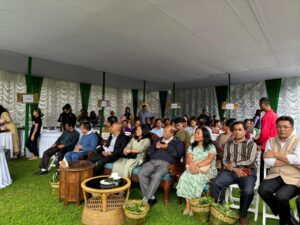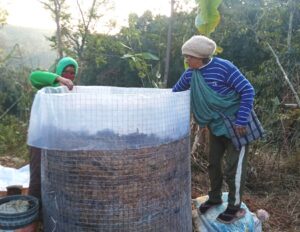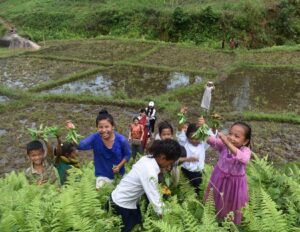“Practicing the age-old method of farming is the way forward.”- Bah Broshon
In light of the much progress that has been made in the sector of agriculture, traditional methods of farming are rapidly being replaced with the conventional methods of crop production. The Green Revolution (GR), powered by excessive use of HYV seeds, chemical fertilizers, insecticides, and pesticides turned India into one of the world’s leading agricultural nations. The impact of the GR has also trickled down to the low-scale farmers that have adopted the use of chemical fertilizers in farming to maximize yield and sale. The same can be said for a small community in Mawbri where most of the farmers have practiced conventional methods of crop production in the last decade or so.
“Many conventional farmers use fertilizers as they expect their crops to be available for the market (even during off-seasons) and earn more money but they completely discard the risk that the products pose on the health and well being of others.” expressed Bah Broshon Lyngdoh Mawphlang, a 75-year-old farmer from Mawbri, East Khasi Hills, who is presently the only farmer in his community to practice traditional farming.
Like most of his fellow farmers, Bah Broshon was also a conventional farmer at first. It was only a change of heart in 2019 that saw him shift completely to the traditional methods of farming. The decision, he states, was with the intention of providing healthy organic food to his family knowing full well the importance of good health. He hasn’t looked back ever since.
In order to maintain a rich diversity in their meals, a number of local crops are found in his garden, viz.- radish, mustard leaves, beans, sweet potatoes, millet, potatoes, maize, jobs tears, and turmeric. He also started cultivating millet through bun cultivation instead of the usual shifting field in 2019 in a bid to revive the staple pulse that had been replaced and forgotten over time.
Over the years, various experiments have led to Bah Broshon developing a simple technique of composting that involves adding grass, dry leaves, and rotten vegetables mixed with water. The simple compost has been used as manure for his farm since he started. In terms of pest management, Bah Broshon takes matters into his own hands, identifying and eliminating each pest he finds on his farm himself. Things have only really gotten out of hand for Bah Broshon when mice and squirrels destroy the crops. The rodents, he says, are the worst pests to his farm.
The small nuisances, however, have not deterred him from advocating the traditional methods of farming to his fellow farmers. He shared, “The ability to provide healthy organic food for the family without the need to buy from the market has been the biggest benefit of traditional farming.” He further reasoned with his fellow farmers that if all of them practiced the indigenous system of cultivating crops, it would boost the production of local food crops and lower the dependency on the market for chemically grown vegetables. In conclusion, Bah Broshon implied, “Traditional farming will surely enable us to stay healthy and live longer.”





